|
|
|
Sort Order |
|
|
|
Items / Page
|
|
|
|
|
|
|
| Srl | Item |
| 1 |
ID:
157190
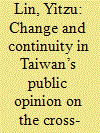

|
|
|
|
|
| Summary/Abstract |
The Sunflower Student Movement was a significant event in Taiwan’s political history. Contrary to the conventional wisdom, we argue that the effect of the movement on the attitude of the general public, particularly the young, toward the cross-Strait economic interactions and the perception that Taiwan may be forced to make political concessions resulting from such ties is limited. Based on the Taiwan National Security surveys, we find out that the movement, to a certain extent, reflected public sentiment already existing in the society, and did not push the sentiment further. Compared to the attitude toward national identity, which is more long-lasting, the views on the cross-Strait economic ties may be more volatile, and are thus less predictable.
|
|
|
|
|
|
|
|
|
|
|
|
|
|
|
|
| 2 |
ID:
157197


|
|
|
|
|
| Summary/Abstract |
This study explores the correlates of early sexual debut and risk factors of sexually transmitted infections (STIs) among the youth in Malawi. Data was obtained from the Malawi Demographic Health Survey 2010. Out of a sample of 2987 males and 9559 females aged 15–24 years, 1405 males and 5217 females were considered. Chi-square and multivariate analysis was performed and findings presented by gender. The results indicate that females aged 15–19 years (OR=4.18), who were Muslims (OR=1.42), with no education (OR=3.99), were significantly more likely to initiate sexual debut early. Meanwhile, males aged 15–19 years (OR=3.50), from the northern region (OR=2.35) and of the Chewa ethnic group (OR=1.45) were significantly more likely to initiate sexual debut early. Muslims males (OR=0.57), from the poorest (OR=0.69) households were significantly less likely to initiate sexual debut early. Females who initiate sex earlier form a distinct risk group in this study. Specific intervention is therefore needed for young females in their early teen years before they initiate sexual debut.
|
|
|
|
|
|
|
|
|
|
|
|
|
|
|
|
| 3 |
ID:
157191
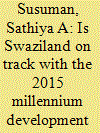

|
|
|
|
|
| Summary/Abstract |
According to the Millennium Development Goals (MDGs) agreement, each participating country has to periodically provide a report that will show the progress on their achievement towards the goals. This article’s aim is to evaluate Swaziland’s prospects of achieving eight MDGs by 2015. This article is an analysis of the current situation of Swaziland, and the aim of this analysis is to look beyond the statistical values to see if the achievements (including lifetime achievements) are on track and whether what is yet to be achieved can really be achieved. Secondary information was collected from various sources. Several countries and organizations have committed themselves to the following eight development goals: (1) eradicate extreme poverty; (2) achieve universal primary education; (3) promote gender equality and empower women; (4) reduce child mortality; (5) improve maternal health; (6) combat HIV/AIDS, malaria and other diseases; (7) ensure environmental sustainability; and (8) develop a global partnership for development. National development is dependent on many factors; therefore, different countries across the world have adopted the MDGs as means of alleviating many of the social ills hindering progress and development. Based on different sources, Swaziland is on track with its MDGs, and there is no doubt that Swaziland will continue to work hard to these ends. It has been argued that there has been progress made that has resulted in significant changes to people’s lives, but the question that has to be asked is how long these achievements can realistically last. A reduction of the rate of child mortality, maternal mortality and HIV/AIDS in Swaziland are needed.
|
|
|
|
|
|
|
|
|
|
|
|
|
|
|
|
| 4 |
ID:
157199


|
|
|
|
|
| Summary/Abstract |
Statutes and policy documents, as well as open-ended interviews in Zhejiang, China, were used to identify key aspects of rural land law reforms in China to help develop the national economy. It has been observed that despite its positive effect on general rural economic development such development is compromised by extensive corruption that harms peasants’ interests. Peasants face new forms of exploitation by local governments and businesses, as well as environmental damage caused by over-exploitation of land and resources that becomes a serious hurdle for sustainable development in rural areas.
|
|
|
|
|
|
|
|
|
|
|
|
|
|
|
|
| 5 |
ID:
157194
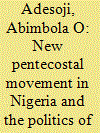

|
|
|
|
|
| Summary/Abstract |
The Pentecostal Movement in Nigeria, like elsewhere, is a distinctly Christian organization by virtue of what it professes and what characterizes it. Increased privileges for leaders, leadership visibility and leadership style have tended to encourage other aspirants to form similar organizations. Despite the existence of an umbrella association like the Pentecostal Fellowship of Nigeria, different centres have emerged, each seeking relevance and influence. Using historical and sociological approaches, this paper discusses the trends in the New Pentecostal Movement in Nigeria, identifies some characteristic types and probes into the basis for belonging, seeking to belong or otherwise. It also interrogates the strategies employed and its effectiveness or otherwise.
|
|
|
|
|
|
|
|
|
|
|
|
|
|
|
|
| 6 |
ID:
157192
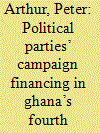

|
|
|
|
|
| Summary/Abstract |
The period from 1992 saw Ghana, under pressure from both internal and external sources, embark on the transition to democratic rule. Despite the strides, an issue that has the potential to undermine Ghana’s liberal democratic credentials has centred on the process of political party financing. The purpose of this paper is to analyse how the existing political party financing system in Ghana is negatively impacting on electoral competition and the country’s democratic process. Drawing on secondary sources, this paper shows that, given that it is political resources that drive party vibrancy and competitiveness, a level playing field in terms of public financing of political parties can help in electoral competition and the promotion of the democratic process in Ghana. However, the importance of transparency and accountability, as well as a legal framework that monitors, denounces, sanctions and punishes abuse in the use of public funds, would be crucial if success is to be attained.
|
|
|
|
|
|
|
|
|
|
|
|
|
|
|
|
| 7 |
ID:
157188
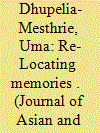

|
|
|
|
|
| Summary/Abstract |
This article plays on the word re-location to examine the memories of Indians in South Africa through oral histories about relocation as a result of the Group Areas Act, to memories of parents and grandparents relocating to South Africa from India as told to interviewers and to their own memories of journeys to India and back. The narratives of mobilities traverse time and national boundaries and are counter-posed by narratives of local mobilities as well as stasis. The article identifies ways of narrating, themes of narration and the meaning of memories while noting the re-location of memory construction against the backdrop of South Africa’s democratic transition and the 150th commemoration of the arrival of indentured Indians to South Africa. It argues that the local and the national are important in narrations of transnational journeys, thus advancing a particular approach to transnational memory studies.
|
|
|
|
|
|
|
|
|
|
|
|
|
|
|
|
| 8 |
ID:
157193
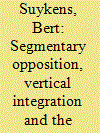

|
|
|
|
|
| Summary/Abstract |
This article aims to conceptualize political relations in Bangladesh by building a descriptive model of these relations. It draws on the concept of segmentary opposition developed by Evans-Pritchard in his study of the Nuer political system and on the concept of vertical integration used in the study of both industrial relations and party structures in federal states. It is argued that the structure of political relations in Bangladesh is based on the interaction of the logic of segmentary opposition and of vertical integration under leader-based groups. The descriptive model is then applied to two cases, based on qualitative fieldwork in Dhaka and Chittagong, to further clarify the model and illustrate its use as an analytical tool.
|
|
|
|
|
|
|
|
|
|
|
|
|
|
|
|
| 9 |
ID:
157189
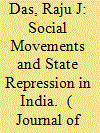

|
|
|
|
|
| Summary/Abstract |
State repression is particularly likely when social movements target property relations that cause ordinary citizens to suffer. Whether these movements are violent, and whether the state is a liberal democracy is a contingent matter. This is illustrated by India’s ‘Maoist movement’ (which is also known as the Naxalite movement because it originated in an area called Naxalbari, located in India’s West Bengal State). Where necessary, sections of this movement use violent methods to fight for justice for aboriginal peoples and peasants. This strategy, which the author, incidentally, does not endorse, has been seen by the state as the greatest internal military threat to it. Such a perception invites state violence. What is often under-emphasized or ignored is that the movement is an economic, political and ideological threat, and not just a military threat, and it is so through its localized alternative developmental activities, and this is also a reason for the state’s violent response to it.
|
|
|
|
|
|
|
|
|
|
|
|
|
|
|
|
| 10 |
ID:
157198


|
|
|
|
|
| Summary/Abstract |
This paper explores reactions to election results in the Brong Ahafo region of Ghana from the perspectives of the politics of belonging debates – the distinction citizens of the same nation-state make between those who belong and those who belong less in one of Ghana’s highly competitive electoral regions. It argues that multi-party democracy has intensified or given rise to social and political tensions or conflicts in some local communities rather than enhance democratic ideals and peaceful coexistence
|
|
|
|
|
|
|
|
|
|
|
|
|
|
|
|
| 11 |
ID:
157195
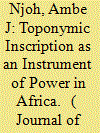

|
|
|
|
|
| Summary/Abstract |
This study analyses toponymic inscription, the exercise of street/place naming, as a tool for articulating power in Anglophone and Francophone Africa. The focus is on Dakar, Senegal and Nairobi, Kenya, which were respectively indispensable for the colonial projects of France and Britain in Africa. Dakar was for France’s West African Federation what Nairobi was for Britain’s colonial East Africa. It is shown that toponymic inscription was used with equal zeal by French and British colonial authorities to express power in built space. Thus, both authorities used the occasion to christen streets and places as an opportunity to project Western power in Africa. With the demise of colonialism, indigenous authorities in Kenya inherited the Western vocabulary of spatiality but speedily moved to supplant Eurocentric with Afrocentric street/place-names. In contrast, post-colonial authorities in Senegal remain wedded to the colonial tradition of drawing most important street- and place-names from the Eurocentric cultural lexicon. Consequently, although the vocabulary of spatiality in Nairobi projects African nationalism and power, that of Dakar continues to express mainly Western power.
|
|
|
|
|
|
|
|
|
|
|
|
|
|
|
|
| 12 |
ID:
157200
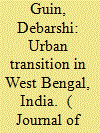

|
|
|
|
|
| Summary/Abstract |
Contemporary urbanization in India is in transition and this, along with the continuation of a ‘top heavy’ urban structure and gradual deindustrialization, is characterized by faster growth of informal employment, a declining trend of urban-ward migration of males, the slow down in the growth of cities and towns and the emergence of new urban centres. Given this immediate backdrop, this paper examines the contemporary processes and emerging forms of urban transition in West Bengal, with its longstanding history of ‘mono-centric’ urbanization. It reveals that urbanization in the state is no longer confined to a few pockets, as many new urban centres have emerged away from them and small towns are growing at relatively faster rates compared to the cities. But the underlying factors of this transition are not associated with the dispersal of economic activities and employment opportunities away from the metropolises. Furthermore, the study is sceptical about the significance of this emerging form of urbanization fuelled by the growth of small cities and towns which have a weak economic base, a crisis of urban governance and inadequate access to basic amenities.
|
|
|
|
|
|
|
|
|
|
|
|
|
|
|
|
| 13 |
ID:
157196
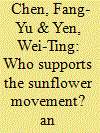

|
|
|
|
|
| Summary/Abstract |
The Sunflower Movement—an occupation of the Legislative Yuan (the Congress) for 24 days—was an unprecedented moment in the history of Taiwan. We examine the social foundation of the Movement and explore an important factor that has long been missing in the literature of Taiwanese politics: nationalism. We divide nationalism into three dimensions: national attachment, national chauvinism, and feelings toward other countries. Using original survey data collected six months after the Movement, we find that national attachment (being proud of Taiwan) and anti-China feelings are unique dimensions and both lead to a higher level of support for the Sunflower Movement. National chauvinism, on the other hand, is not associated with supports for the Movement. Furthermore, the impact of nationalism is contingent on sociotropic views. People who express higher levels of nationalism are more responsive to the issue of rising income inequality when evaluating the Movement. The underlying logic is when people are more nationalistic they care more about the potential social impact of expanding socio-economic exchanges with another country. These results point to it being necessary to disentangle various components of nationalism and further investigate their effects on individuals’ political behaviors.
|
|
|
|
|
|
|
|
|
|
|
|
|
|
|
|
|
|
|
|
|